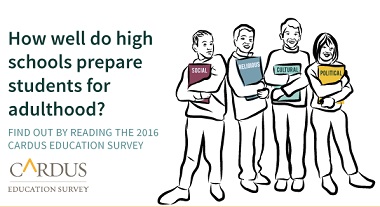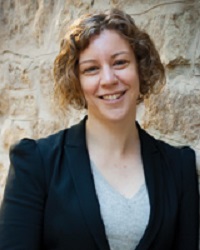
Cardus Education has led the way in measuring graduate outcomes from religious independent schools, with four major surveys since 2011.
“Private education does not, as some stereotypes might have it, create a secluded, privileged class that is largely uninterested in the common good. In fact, [a] 2016 survey found the opposite to be true for non-government schools.”
That is the key finding from the Cardus Education Survey, a major new study which measured graduate outcomes from religious independent schools.
Dr. Beth Green, director of research for the project (and program director for education at Cardus) will be in Surrey this Saturday (November 5) to speak with leaders of Christian schools from around the province. She will be the plenary speaker at the 17th Annual Leadership Conference for the Society of Christian Schools in BC.

Dr. Beth Green, director of research for the 2016 Cardus Education Survey, will be speaking at SCSBC’s annual leadership conference.
In a very topical October 31 article for Policy Options magazine (‘Educational monopoly doesn’t serve students or society’), Green said:
The more provincial governments clash with school boards and unions over education issues, the more parents consider alternatives to government-run schools. The common objection is that social outcomes such as tolerance and civic engagement would suffer if more students attended independent religious schools. In fact, recent research suggests the opposite is true. . . .
Repeated findings from Cardus research undermine the stereotype that a public school is the best possible forum for fostering civic and political engagement. Rather, the graduates of public and separate Catholic [not found in B.C.] schools are less likely than evangelical Protestant, Catholic independent and nonreligious independent school graduates to feel responsible for helping those in need. . . .
Our survey also undermines a persistent critique that Christian private schools are breeding grounds for political extremism and social isolation.
Graduates of evangelical Protestant schools are in fact less likely to be involved in political activities than public school graduates and demonstrate similar levels of trust and confidence in Canadian society and its institutions. The graduates of independent Catholic schools have a more diverse set of social ties, for example, being friends with people of a different religion or no religion at all, than public school graduates. What is more, the graduates of evangelical Protestant schools have social ties just as diverse as those of public school graduates.
There is also no difference between graduates of private Christian schools and public school graduates on the value they place on tolerance. This evidence belies the popular myth that graduates of independent Christian schools exist in encapsulated social networks, sequestered in religious silos that are somehow at odds with Canadian common life.
For the full Policy Options article go here.
Cardus is a think tank dedicated to the renewal of North American social architecture. It conducts independent and original research, produces several periodicals, and regularly stages events with Senior Fellows and interested constituents across Canada and the United States.
*****************************
A backgrounder on the Cardus Education Survey said findings show graduates from private schools would:
• Be valuable contributors to the economy and value further education and life-long learning. Christian private school graduates are just as equipped to find work and attain credentials after high school as public school graduates. Evangelical Protestant graduates are more socially mobile and more likely to be in managerial or professional roles.
• Be informed citizens who value democratic participation and civic engagement. This is the fourth in a series of rigorous and credible research studies to demonstrate that Christian private schools are not breeding grounds for political extremism. Evangelical Protestant graduates are in fact less likely to be involved in political activities than public school graduates and demonstrate similar levels of trust and confidence in society and its institutions.
• Be confident, responsible, self-sufficient, honest, fair and ethical adults. Evangelical Protestant and independent Catholic graduates are more likely to volunteer in non-church organizations. Evangelical Protestants are more likely to give blood, to donate to charity and to report that they feel responsible for the welfare of others than public school graduates.
• Contribute to a peaceful, pluralistic, and cohesive society. The graduates of independent Catholic schools have a more diverse set of social ties than public school graduates. The graduates of evangelical Protestant schools have social ties just as diverse as those of public school graduates. Graduates from private independent Christian schools value tolerance to the same degree as do public school graduates.
• Live personally fulfilled and healthy lives. Private Christian school graduates report a significantly more positive view of their secondary education and are more likely to believe that they were prepared for life after high school. (This study does not measure the health of graduates.)
************************
One point of clarification. This article should not be taken to suggest that I think private education is superior to public education. Both are valuable. My wife and many friends and acquaintances in the church have worked happily and productively in the public system. Our five children all went through the public system.
However, there is a persistent call, in some quarters, for the elimination of public funds for private education:
* Pete McMartin, whose articles I usually love, wrote a misguided piece October 22: This is egalitarian Canada, so why should private schools get public money?:
. . . As a taxpayer who believes in that separation of church and state [he’s confusing us with the U.S.; Canada doesn’t have such a system], and who believes in those cohesive forces, I don’t want my tax dollars going to schools that either exclude on the basis of religion, believe the classroom is a place for religious instruction, or that cherry-pick the students they want in their schools. If you do believe that, fine. Pay for it yourself. . . .
* The Tyee posted yet another anti-private school piece, October 25, by Crawford Killian: The causes and consequences of BC’s private school growth:
. . . Private schools, in effect, educate their own communities, children and adults alike. Public schools try to do the same thing for the larger community – but part of that community has already seceded. . . . I see no end to this social divide until all education is both public and consistently good everywhere in the province. . . . In that happy event, choosing a private school would be a matter of personal taste, like buying Perrier rather than drinking pure tap water. And taxpayers’ dollars should subsidize only the public good, not matters of personal taste.
I wrote an article on the topic in September: Media debate falsely pits public versus private education.

When I transferred from public school to Christian school for senior high, I was looking forward to a faith-based education. Instead, I met people so angry, so rebellious and so smothered that they made the most rebellious student over at public school look like an angel.
Very few of the people from my grad class – at one of BC’s most respected private Christian schools – are still Christians today. And sorry, I met some of the most terrifying racists – and I have complained to this school about what I saw, but they still refuse to deal with it.
I’m not entirely sure I believe this study. . . . I notice some of the private Christian schools are slipping in their academic outcomes according to the Fraser Institute.
Buyer beware – sometimes what faith needs to flourish is a challenge. There’s also this thing called “I sent my kid to Christian school because he/she was so rebellious and needed to be fixed.” Also, look at the staff of some of the major Christian schools here in the Valley: mostly Euro-centric people of Dutch and Mennonite backgrounds.
It has been many years now since both of my children went through their schooling. When they were in a Christian Primary (K-7) school, my wife and I were both active on the school’s boards and committees, as well as the SCSBC. Both later moved on to public high school where again both their parents took active roles within that community.
There is one factor which continues to baffle me with this on-going debate over public funding for private schools: It is this: if all funding (a maximum of 50% per student of the payment to public school boards) were to be diverted solely into the public system, SCSBC has calculated that the capital costs to build the extra schools needed for the predicted influx of 45 – 50,000 additional students would bankrupt our province within 10 years, since currently all capital projects for private schools are self-funded. Yet no one on the “cancel funding private education” caucus seems to have grasped this salient fact.